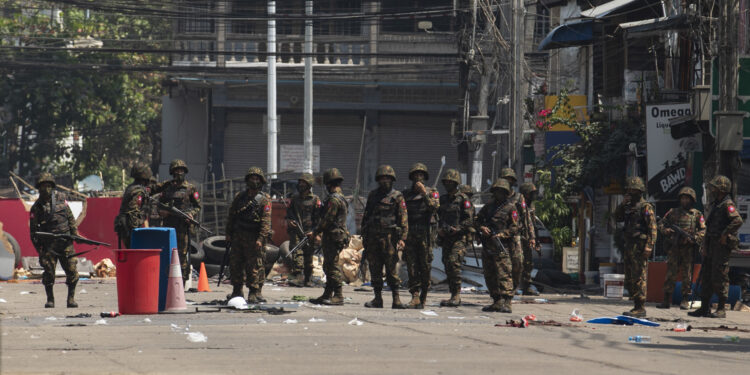In a record-breaking seizure of improvised explosive devices, the Myanmar regime has confiscated more than 2,000 homemade bombs and firearms in Yangon and arrested nearly two dozen people accused of possessing the explosives.
The seizures and arrests were made late last week and weekend, and come as the country’s business hub continues to be rocked by occasional blasts and deadly attacks on security forces.
The regime’s Myawaddy TV announced on Friday night that 23 people had been arrested at several locations in Yangon from May 21 through Sunday.
They were arrested together with three pistols, three magazines, 2,080 homemade bombs and 44 time bombs among other items, according to the announcement.
“Effective action will be taken under the law against terrorists who threaten the lives, property and social security of the people who want to live in peace,” the regime said.
In a separate announcement on the same day, the regime’s TV broadcaster said another 20 people had been arrested from May 13-17 in Yangon. They are accused of attending explosives training in areas controlled by ethnic armed organizations (EAOs), sharing what they learned with others, smuggling firearms into Yangon and arranging to send people for training in EAO-controlled areas.
As the news was being broadcast on Friday night, regime troops stationed at a pagoda compound in Yangon’s Thaketa Township were targeted by unknown attackers. Residents reported hearing explosions and a volley of shots ringing out as the two sides exchanged gunfire for several minutes. On Wednesday morning, the area was rocked by at least five explosions, killing one of the regime’s local administrators. Blasts were also reported in other areas of the city over this week, causing a number of casualties among security forces.
The series of attacks on regime troops comes amid warnings on social media by anti-regime resistance forces that they plan to step up attacks in urban areas in the coming weeks.
No one has claimed responsibility for the attacks in Yangon.
Outside the city, regime troops in other areas of the country have come under attack from local civilian resistance forces, with both sides sustaining casualties.
Following the regime’s deadly crackdowns on pro-democracy protests on streets across the country in March and April, a number of anti-regime protesters fled to areas controlled by ethnic armed groups on the borders. They have received military training from ethnic armed groups who oppose military rule, hoping to join the People’s Defense Force (PDF), the armed wing of Myanmar’s parallel National Unity Government (NUG).
As of this week, more than 800 people had been killed by the regime since the Feb. 1 coup, according to the Assistance Association for Political Prisoners-Burma (AAPP), which has been monitoring civilian casualties caused by the junta.
The exact number of trainees on the border is unknown. But according to some media estimates there may be at least several hundred, including doctors and other young professionals.
Early this month, the regime arrested 39 people who according to military-owned media were suspected of orchestrating explosions and arson attacks, as well as seeking military training with an ethnic minority rebel group.
Following the arrests, the junta sent a letter to the country’s oldest ethnic rebel group, the Karen National Union (KNU), objecting to its involvement in providing training to civilian resistance fighters, citing information obtained during its interrogation of the detainees.
You may also like these stories:
Myanmar Junta Forces’ Temporary Base Attacked in Yangon

















